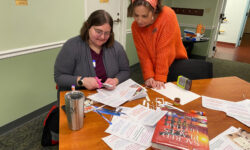When she began researching her Girl Scout Gold Award project, Medfield's Catherine Callahan was interested in the topic of pollinators, and learned about the dangerous decline of monarch butterflies. Monarch butterflies play a vital role in the ecosystem. Flying from flower to flower, their bodies pick up pollen and spread it to the next plant, leading to pollination. The biggest reason for the population decrease stems from their loss of habitat. Monarch butterflies lay their eggs on milkweed and once hatched the caterpillars eat it. The widespread use of harmful pesticides and land development has been killing the milkweed supply.
Catherine planted a Monarch Waystation at the Ralph Wheelock School. The Waystation included both milkweed plants and nectar plants, which sustain monarch butterflies. Catherine selected a variety of nectar plants to ensure there were flowers blooming from April through October. The Waystation also provided a safe habitat for the monarch butterflies, free of pesticides. “Over the summer, countless monarch butterflies were seen at the garden, as well as eggs and caterpillars on the milkweed,” said Catherine.
In addition, Catherine raised monarch butterflies at her home and at the Medfield Library. “By rescuing monarch butterfly eggs from dangerous locations, like the side of the road, or an area with lots of construction, I was able to raise them in a safe environment, increasing their likelihood of survival,” said Catherine. “I raised 29 monarch butterflies in total. This is significant, because only about 10 percent of monarch butterfly eggs survive to become full grown butterflies. 100 percent of my monarchs survived and were released into the Waystation or the Medfield Garden Club’s native garden at the library.”
Catherine educated the youth of Medfield on the importance of monarch butterflies and other pollinators, and what they could do to ensure that monarchs would survive and thrive in their town. “I put together lesson plans and activities for the 2nd grade teachers at Ralph Wheelock School. The lesson plans I provided will assist the teachers in educating the kids about the miraculous life cycle of monarch butterflies and what threatens their future (i.e. the loss of habitat),” said Catherine.
To educate the greater community, Catherine raised 13 monarch butterflies at the Medfield Children’s Library, surrounded by books on monarch butterflies, handouts, and a question and answer interactive activity. Catherine and her content advisor, Madeline Champagne, put on a presentation at the Medfield Public Library about monarch butterflies, which attracted all ages from the community. Finally, she sent seed packets and information/activity folders to four Brownies troops in Maryland and Pennsylvania. These troops were selected as they are located along the monarch migration route. In addition to providing milkweed and nectar plant seeds, Catherine included customized directions for the Brownies on how to make monarch seed balls.
To keep her Girl Scout Gold Award project going, the 2nd grade Brownie troops in Medfield will use the Waystation as a living learning tool to earn badges year after year. The binders she compiled and presented to the 2nd grade teachers at the Wheelock School are sustainable and will be used for years to come. The Medfield Library plans to raise monarch butterflies again next spring/summer (2020).
“Girl Scouting means empowerment,” said Catherine. “Girl Scouts produces active leaders that are not afraid to address community needs and find solutions.”










